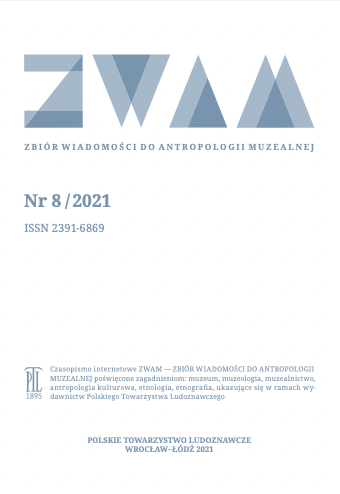Kolekcja etnograficzna Muzeum Tatrzańskiego. Działalność Juliusza Zborowskiego w latach 1945–1949
The ethnographic collection in the Tatra Museum. The Juliusz Zborowski period in the years 1945–1949
Author(s): Magdalena KwiecińskaSubject(s): Anthropology, Cultural history, Museology & Heritage Studies, Cultural Anthropology / Ethnology
Published by: Polskie Towarzystwo Ludoznawcze
Keywords: Juliusz Zborowski; Bronisław Piłsudski; ethnographic collection; Podhale; Spisz; Orava; the Tatra Museum; Polish museology after the Second World War
Summary/Abstract: Juliusz Zborowski was the first director of the Tatra Museum. He was in charge of the insti-tution from 1922 to 1965 and thanks to his active involvement he is considered today to be an important figure in the history of Polish museology. The Tatra Museum became a model for regional museums to follow during the interwar period (1918-1939). At first, it was run by an informal organisation of enthusiasts. In 1950 the Museum became a state institution, which resulted in gradual structural and management changes. This article describes the ethnographic collection in the Tatra Museum and the process of its development from the aftermath of the Second World War until the institution was nationalised. During this period, Zborowski tried to acquire smaller private collections and single items. He wanted to gather the region’s earliest folk arts and crafts. He created a catalogue which contains numerous sheets of paper with hand-written notes providing details of the museum’s artefacts. It remains an important source of knowledge. He corresponded with numerous researchers from all over Poland. This correspondence formed a collection of more than 8000 letters and provides an interesting framework to study the process of collecting at that time. Zborowski was very consistent and his professional aims didn’t change during the time when he worked as a director. He tried to keep the research activities of the institution alive. Looking back, Juliusz Zborowski was a pioneer of Polish museology thanks to his work methods which tried to encourage not just educational but also greater research activities at the museum. These continue to be adopted and provide inspiration for contemporary museologists in Poland.
Journal: Zbiór Wiadomości do Antropologii Muzealnej
- Issue Year: 8/2021
- Issue No: 1
- Page Range: 89 - 112
- Page Count: 24
- Language: Polish

